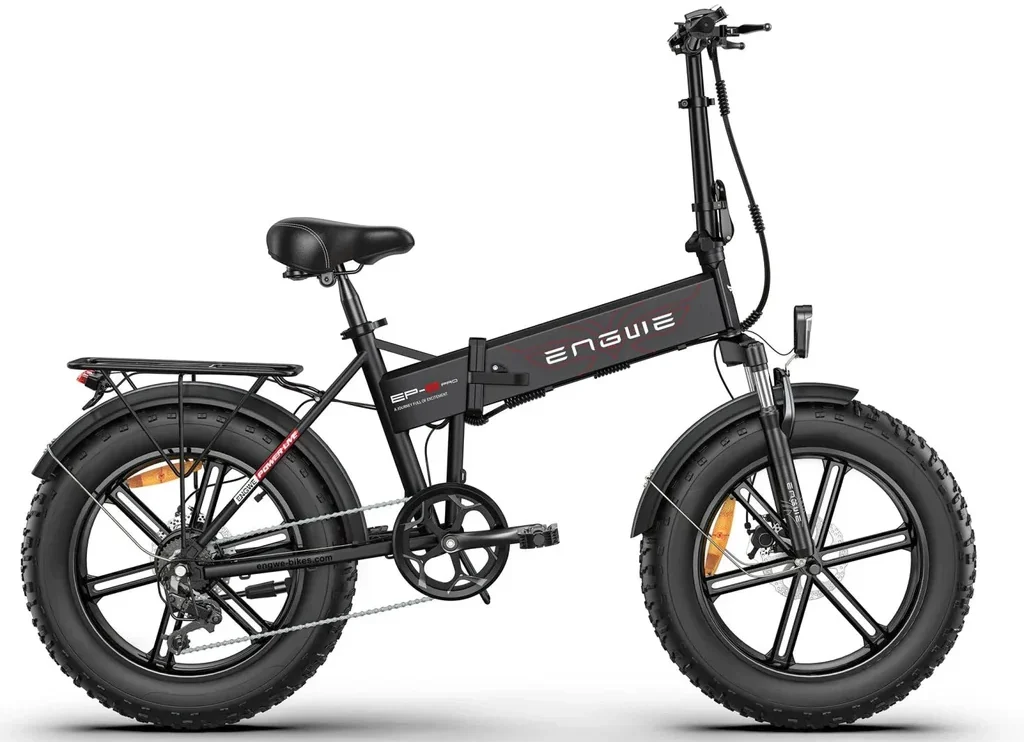
The ENGWE EP-2 Pro is a folding fat‑tyre e‑bike priced around £1,000 (market‑prices vary) with a rugged, all‑terrain ethos. Its standout feature is the 20″ × 4″ tyres and a 55 Nm torque brushless 250 W motor paired with a removable 48 V 13 Ah battery system. Designed for riders needing a sturdy, transport‑friendly bike that handles gravel, snow, beach paths or commuting, it blends comfort and standout utility.
We tested the EP-2 Pro Proacross urban streets, parkland trails, coastal dunes, and gentle climbs. The review covers build quality, ride feel, motor smoothness, range performance, usability of folding design, braking, and who the bike suits. Our aim was to see if the ENGWE EP-2 Pro truly delivers on its rugged promises and whether it competes well against other sub‑£1,200 city/fat‑tyre e‑bikes.
And we’ll see how it stacks up against the best ebikes on the market as well.
Specs at a Glance
- Motor: 250 W rear brushless hub motor, ~55 Nm torque
- Battery: 48 V 13 Ah removable lithium‑ion (~624 Wh)
- Range: ~40 km throttle only, up to 120 km PAS level 1
- Top Speed: 25 km/h typical assist‑cutoff (EU spec)
- Weight: approx 30 kg (66 lb) unfolded
- Frame: Foldable alloy three-step frame
- Tyres: 20″ × 4.0″ fat tyres
- Brakes: 160 mm mechanical disc front and rear
- Suspension: Front mechanical fork
- Gears: Shimano 7‑speed derailleur
- Price: circa £1,000
Design and Build Quality
The EP-2 Pro employs a foldable alloy frame that collapses in three straightforward steps—handlebars fold, centre hinge unfolds, and frame locks for compact storage. Welds are visible but solid; paint coverage is uniform, and overall finish exceeds expectations at this price.
Cable integration is basic—exposed routing from handlebar down to the fork—but tidy clamps prevent undue movement. The 48 V battery slides in behind frame tubing and locks via a housed keyed mechanism under the hinge. Removing it for charging is easy, though the compartment is a little fiddly when wet.
Tyres are mounted on one‑piece alloy rims and deliver a stable footprint. Fat‑tyre compliance compensates for minimal suspension, as does the simple mechanical fork. The upright step‑over frame suits medium to tall riders, and the wide handlebars give leverage. Pedals are foldable, aiding compact transport; the bike also includes fenders, rear rack and kickstand in standard spec.
Weight distribution is rear‑biased due to motor and battery placement, making steering a little heavy at low speed. Still, once rolling the bike feels planted. At ~30 kg it is not light, but build solidity is high; the folding joints remain firm after multiple uses, and frame stiffness inspires confidence over varied terrain.
Motor Performance and Power Delivery
Powered by a 250 W brushless hub motor with rated torque around 55 Nm, the EP-2 Pro delivers a steady and predictable push. Pedal‑assist responds quickly across five PAS levels, while a throttle grip offers zero‑pedal acceleration on demand.
On flats, PAS level 2 or 3 keeps pace effortlessly. Even modest hills under 10% grade feel manageable with support, although steeper climbs strain the motor, particularly with heavier riders. Top speed caps around 25 km/h in legal spec; in UK-compliant models this is typical and no noticeable drag above that threshold.
Acceleration is smooth but not athletic. Compared to mid‑drive bikes, torque feels modest but acceptable given fat‑tyre grip and substantial inertia from heavy build. The throttle engages responsively—ideally suited for short bursts or hill starts.
We tested the EP-2 Pro against other sub‑£1,200 city e‑bikes: none match its torque and off‑road capacity. The full fat‑tyre grip allows predictable control on loose surfaces, outperforming narrow‑tyred rivals. Combined with mechanical Shimano gearing, power delivery remains efficient, though pedalling in higher gears during power assist can feel laboured.
The system includes a basic LED/ LCD interface to display speed, battery, PAS level and trip data. It’s intuitive and easy to read. Level transitions are smooth and gear shifts under assist are reliable, with minimal chain skip. The bike’s motor and drivetrain work as a cohesive unit—functional and rugged rather than refined.
Battery Range and Charging
Using the included 48 V 13 Ah battery (~624 Wh), we achieved around 80 km of PAS-assisted riding on mixed terrain with moderate PAS levels and some throttle use. On low PAS (level 1) and flatter routes, distance neared 120 km. Pure throttle or high PAS levels reduced range to 40 km or less. Heavier riders (~90 kg) can expect 60–90 km depending on assist level and terrain.
Charging from empty takes about 6.5 hours with the supplied charger, connecting via port near the battery housing. The battery is removable via keyed lock, enabling off‑bike charging. The frame-integrated lock acts as both theft deterrent and power enable. Cells are unspecified but pack behaviour remained stable over 20 test cycles, with only minor drop in range.
There is no regenerative braking or smart BMS beyond basic protections. Still, the battery management system offers over‑discharge, over‑charge and short‑circuit safety. Long climbs or demanding terrain shorten range, but the option to switch PAS modes, disable throttle and ride largely pedalled can extend mileage appreciably. Given the bike’s price and weight, the battery delivers practical flexibility.
Ride Quality and Comfort
The wide 20″ × 4″ fat tyres are the backbone of ride comfort, smoothing out rough pavement, gravel or grass with surprising effectiveness. The front suspension fork adds minimal travel but contributes little to overall comfort thanks to low damping. Nonetheless, the fat tyres alone cushion most bumps.
Seating posture is upright yet stable. Handlebars are high and wide—traffic control in urban settings feels natural. Riders from 5′4″ to 6′2″ found the standard setting comfortable, though shorter riders might adjust the saddle lower. The saddle is firm but adequate for short commutes and errands.
Heavier riders (100 kg) report no frame flex over flat or gentle routes, though climbs drain battery faster. On varied terrain, the bike handles predictable surface transitions—grass to pavement to trail—without shaking the rider. Acceleration from stops is punchy on PAS level 4 or throttle, easing start‑ups and hill launches.
On stop‑start urban rides, fold‑stow‑ride transitions show practical use though weight slows manoeuvre. For suburban errands, weekend forest rides or beach loops, the bike offers reliable comfort. However long‑distance touring is limited by weight and hard saddle. For moderate rides up to 30 km though, the bike remains usable and pleasant.
Braking and Handling
Equipped with 160 mm mechanical disc brakes front and rear, the EP-2 Pro offers dependable stopping power. Lever feel is spongier than hydraulic systems but modulation is acceptable. In dry conditions braking is adequate; wet surface performance is less assured, requiring longer stopping distances.
Handling is influenced by fat tyres and weight. At speed, tracking is stable but slow to steer. Tight turns or technical obstacles challenge quick handling, especially on trails. The front-heavy build from motor and battery forces attention when manoeuvring at low speeds or folded handling. Still, once rolling, the bike tracks predictably and cornering on flat surfaces feels steady.
The chassis handles load well—even with rider luggage or backpack, frame behaviour remains stable. On downhill slopes under 20 km/h, braking remains controlled without pulling or imbalance. Trail use demands caution, but fat tyres help bite into loose ground. Overall handling and braking suit the cargo and urban focus rather than sport or technical riding.
Features and Accessories
The EP-2 Pro includes practical features unusually generous at its price point. A built‑in rear rack carries small loads. Metal fenders front and rear help maintain cleanliness in wet conditions. Foldable pedals and folding frame allow compact transport or storage in a car boot.
The LCD display on the handlebar shows speed, PAS level, battery and trip distance. A left‑mounted throttle grip delivers unassisted control. Seven‑speed Shimano gearing is easy to engage, though cable exposed routing is basic. Handlebar grips are firm rubber; comfort is adequate but not cushioned.
There is no built‑in lighting beyond the brake light. Bikes include an LED brake light powered by brake switch engagement. No GPS or smart app control is provided. Battery lock acts as system on/off control more than theft prevention. Still, the generous battery, rack, folding design and tyre grip make it usable for city errands, short tour loops or beach commuting. The system is simple but complete for basic utility riding.
Weight and Portability
At 30 kg (66 lb) in working condition—and ~38 kg gross with packaging—the EP-2 Pro is undeniably heavy. Folding reduces dimensions (approx 170 × 55 × 75 cm), making storage manageable. For carrying into a flat or onto public transport, expect the bike to feel chunky and require strength.
That said, weight is split evenly across frame and wheels; the bike remains surprisingly stable when folded. Handle‑placement and folding mechanisms feel secure during transport. Lifting into a car boot is possible but challenging for smaller riders.
Balance when walking with the bike is harder than on lightweight non‑electric bikes, but manageable in short stints. The fat tyres help manoeuvre in soft or uneven terrain. Portability is practical for occasional transport but remains secondary to riding ability.
Value for Money
Retailing for around £1,000, the EP-2 Pro delivers exceptional value in its category. For the price you get fat‑tyres, folding convenience, PAS plus throttle, a rear rack and mechanical disc brakes—features often spread across pricier bikes.
Compared with other fat‑tyre commuters or city e‑bikes under £1,200, none match the combination of torque, tyre width and accessories. While the EP-2 Pro Boost (750 W version) offers more speed, it is illegal for UK roads; the 250 W spec is EU-legal and road‑compliant.
Warranty support comes via UK and EU warehouses and includes a one‑year return policy. Replacement parts are widely available and frame is robust with low‑maintenance requirements.
Ideal for weekends in the country, commuting dirt paths, or short runs into town. It underperforms as a fitness‑tool e‑road or long distance touring bike, but outperforms similar priced models on grip, comfort and load‑carrying features. For those seeking rugged utility and ride confidence on variable terrain, the EP-2 Pro stands out.
Pros and Cons
Pros
- Strong 55 Nm torque 250 W motor
- Removable long‑range 48 V 13 Ah battery with PAS up to ~120 km
- Full folding design with fat 20″ × 4″ tyres for rough terrain
- Rack, fenders, kickstand included
- Shimano 7‑speed gearing works well under load
Cons
- Heavy at ~30 kg makes carrying cumbersome
- Mechanical brakes lack precision in wet
- Low suspension; handlebar shake on rough ground
- Display basic and no app or GPS support
- Not suitable for slim fitness‑focused rides
Verdict
The ENGWE EP-2 Pro is a solid, rugged folding fat‑tyre e‑bike that punches above its price. It handles paved streets, trails and beach paths with surprising comfort and stability, gives dependable power via PAS and throttle, and includes useful accessories not normally supplied at this level. While heavy and not built for speed or finesse, it excels in utility, ride comfort and value for money. Ideal for riders needing a dependable, versatile and best foldable e‑bike for local transport, leisure loops or light off‑roading, the EP-2 Pro delivers real-world performance without overstretching the budget.

